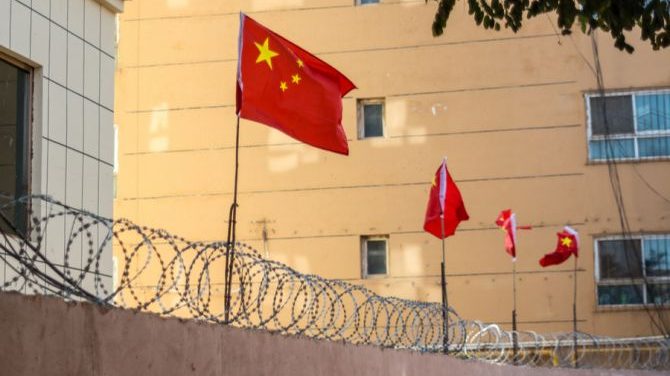The Chinese Communist Party is targeting organized religion as a threat – even seeking to “change” or “transform” it into a loyal party apparatus, a panel of foreign policy experts said on Monday.
The party, which “historically managed religion” in China, is now taking a much harsher approach and “trying to change it or destroy it,” said Nury Turkel, vice-chair of the U.S. Commission on International Religious Freedom, at a panel event of the Hudson Institute on Monday. Turkel, a Uyghur-American human rights advocate, was born in a re-education camp in China.
To the party, any organized religion “is perceived as a threat,” Turkel said, adding that the party is trying to “create a new type of religion.” Panel members noted that Chinese president Xi Jinping called for the “sinicization of religion” in a 2016 speech, warning that his party is actively seeking to change religious practice to promote its socialist interests.
The panel referenced developments such as the mass internment of mainly-Muslim Uyghurs in the country’s northwest province of Xinjiang, as well as allegations of forced organ harvesting of ethnic and religious minorities, including Falun Gong practitioners, Uyghurs, Tibetans, Muslims, and Christians.
The United States and other countries must pay attention to what the Chinese Communist Party is saying about Xinjiang, Turkel emphasized, citing remarks by President Xi Jinping to “show absolutely no mercy” to the Uyghurs. The Xinjiang Communist party secretary Chen Quanguo has given orders to “round up everyone who should be rounded up,” Turkel noted.
According to the U.S. State Department, more than one million Uyghurs and other predominantly Muslim ethnic minorities have been put in internment camps, while two million others are subject to forced daytime “re-education” training.
While the party is not detaining mass amounts of Christians as it is the Uyghurs, many Christian leaders have been detained without trial for not following the party’s demands, said Nina Shea, senior fellow and director of the Center for Religious Freedom at the Hudson Institute.
Cardinal Joseph Zen, the retired Bishop of Hong Kong, has compared the erosion of religious freedom to “being put in a little bird cage,” she noted.
Xiaoxu Sean Li, communications director for the Falun Dafa Association, noted the June 2021 statement of 12 United Nations human rights experts that there was “credible evidence” that religious and ethnic minorities in China were targeted for organ harvesting. Medical data of detainees is being collected for a large database that identifies potential donor matches . Detainees are then killed and their organs are harvested and shipped, he said.
Robert Destro, a law professor at The Catholic University of America and former Assistant Secretary of State for Democracy, Human Rights, and Labor in the Trump administration, claimed that the party is now carrying out everywhere what it has been doing in Tibet for years. The party has extracted natural resources from the region and set up surveillance systems while stamping out religious practice, he said.
“Basically, they will sell, they will monetize everything from the natural resources to your liver,” he said of the party, “and anything that gets in the way – particularly religion.”
Shea also noted concerns that Catholic leaders could be vulnerable to blackmail or surveillance by the Chinese Communist Party.
“The Vatican has technology that can be easily penetrated, and has been,” she said. In 2020, just months before the Vatican-China deal was renewed, researchers at a U.S.-based cybersecurity company reported that Vatican computer networks and the Catholic Diocese of Hong Kong were targeted by Chinese state-sponsored hackers.
Former cardinal Theodore McCarrick, laicized in 2019 after the Vatican determined he was guilty of abusing minors and vulnerable adults, traveled to China eight times and stayed in a seminary of the government-sanctioned church. “There is a lot of blackmail potential there,” Shea said.
Panel members also expressed concern over the agreement between the Vatican and China on the ordination of bishops, initially reached in 2018 and renewed for another two-year period in 2020.
Shea mentioned the case of Bishop Vincent Zhan Silu of Mindong/Funing in Fujian Province, who was consecrated under the deal after Bishop Joseph Guo Xijin, of the underground Catholic Church stepped aside. Zhan reportedly led a delegation of 33 priests to participate in a "formation course" at the Central Institute of Socialism, in collaboration with the United Front of Fujian Province, where they listened to presentations on the "sinicization of religion."
“To carry out the sinicization of religion with determination, we will continue to follow a path that conforms to socialist society," Zhan said in August 2019.
“He really exemplifies the [party’s] model new Christian leader,” Shea said of Zhan.

